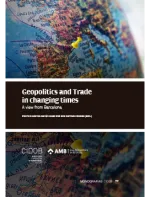Reforming a World Trade Organization in crisis: mission impossible?

Since its launch in 1995, the World Trade Organization (WTO) has contributed to the liberalisation of international trade on a global scale. This has fostered the globalisation of the economy, the relocation of many companies and the formation of global value chains. For years, among other factors, the WTO has promoted economic growth, the expansion of transnational corporations and the development of emerging economies, particularly China and other rapidly industrialising Asian countries.
Even at its height, the WTO faced criticism, with various social movements holding resounding protests against neoliberal globalisation and its asymmetric beneficiaries during the 1999 Ministerial Conference in Seattle. But many voices have also defended the WTO and globalisation, stressing that opening up global markets has played a large part in lifting hundreds of millions of people in emerging economies out of poverty. It was also argued that a rules-based multilateral trading system guaranteed by an advanced dispute settlement mechanism chaired by the WTO Appellate Body would bring more legal certainty and predictability to international economic relations.